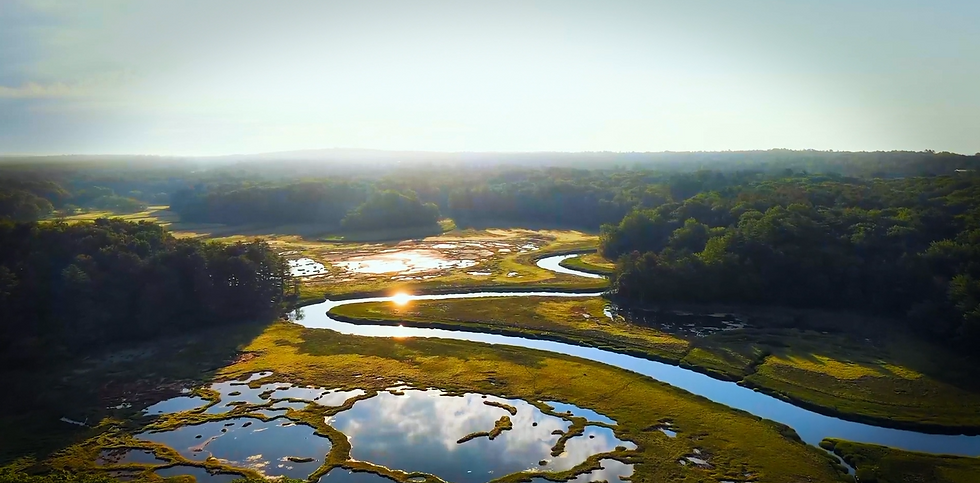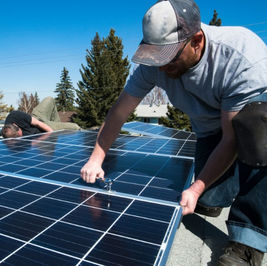
How Yarmouth Contributes to Climate Change
When residents, visitors, and workers engage in daily activities we typically use energy that is created by burning fossil fuels, such as oil and gas. Burning fossil fuels creates greenhouse gas emissions (GHGs) that add to the already high levels of GHGs in the atmosphere and contribute to climate change.
The Sustainability Department conducted a thorough investigation into the Town's emissions from 2020 to 2024. The data below is a preview of the Data Report released in June of 2025. Greenhouse Gas Emissions modeling is not a perfect science and includes data estimates from modeling. To get a more accurate picture of trends in fossil fuel and energy use over the years, the Department gathered consumption data reported from utility companies. For more detailed information of these trends please see the Report.
Takeaways from the Data
Emissions and mileage from in-town transportation is increasing but there are more EVs on the road.
Commercial electricity use is decreasing, and residential use is stable despite a rise in business activity and home electrification.
Total tons of waste dropped 20% since 2019 and recycling is increasing, pointing to successful waste diversion efforts.
Municipal and school energy and fossil fuel use has increased.

Burning gasoline to power our vehicles is the biggest single source of emissions in Yarmouth.
Municipal Emissions
Emissions from Town and School operations contribute 3% of the community-wide total.
These emissions are largely from fossil fuels, such as natural gas, used to heat municipal and school buildings and diesel used for fleet vehicles. Only a small portion of emissions comes from other operations, such as waste water treatment and traffic signals.
.png)
Emissions by Sector
Compared to 2019, community-wide emissions are about 4% lower overall. Over the last several years, transportation emissions have been trending upward. Emissions from residential buildings decreased and commercial building emissions increased. Waste emissions are significantly lower.

Emissions by Energy Source
.png)
In both 2019 and 2024, gasoline used for vehicles is the largest single source to emissions locally, followed by electricity use and the burning of heating fuel in homes and businesses. Relative to 2019, emissions from natural gas and fuel oil have increased slightly, while waste and propane emissions decreased the greatest extent. As the State’s grid becomes greener, emissions from electricity will decrease.

Since we have a model of where emissions in Yarmouth come from, we can take steps to reduce emissions and work towards our net zero goal.
The course ahead
To work towards net zero emissions, we will need to take strategic steps in our top-polluting sectors: buildings, transportation, and waste.

Our Pathway
Like so many other communities, private businesses, and State and national governments, Yarmouth faces monumental challenges to reach net zero. It requires thoughtful, bold actions across our whole community that fundamentally change the way we go about ‘business as usual’. While a 4% decrease in emissions over 5 years may seem small, there are indicators that Yarmouth is on the right track through efforts such as an increase in beneficial electrification, EV adoption, and Town decisions to lead by example. State and regional efforts are also key to our community reaching our goals - such as powering our electric grid with more renewables and facilitating public transit options so residents and visitors don’t have to rely on cars to get where they need to go. As technology, best practices, funding, and community priorities evolve, the Town will continue to work towards a sustainable, low-carbon future that benefits our local economy, community connections, and quality of life.
The Bigger Picture
Local governments are uniquely positioned to empower residents and businesses to reduce emissions while adapting policies and services to work towards a net zero future. We know that our town can play our part, but we also rely on broader change. Both the federal government and the state of Maine are actively guiding and incentivizing municipalities with funding, technical resources, and policy.
Governments will need to continue supporting essential solutions at scale, big companies will have to make changes to how they do business and what they offer consumers, and families and local businesses here in Yarmouth (and around the world) will need to take action. With collective action and smart investments, we can move the needle to meet local, state, and national goals.
Stay Informed & Get in Touch
Subscribe below to receive our newsletter and updates on the Town's climate action efforts.
You can also send us your questions, comments, and ideas by emailing yarmouthclimateaction@gmail.com.







